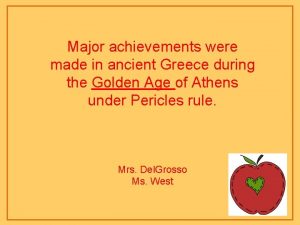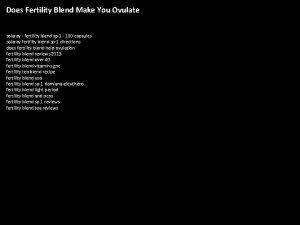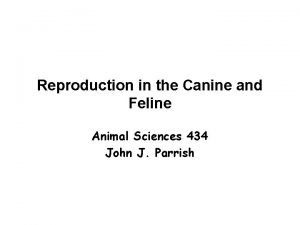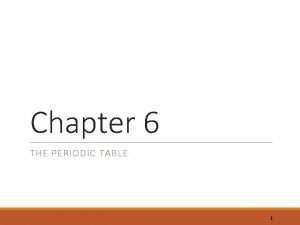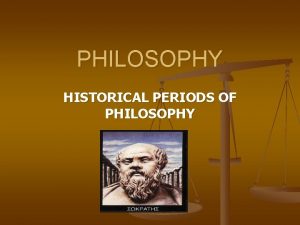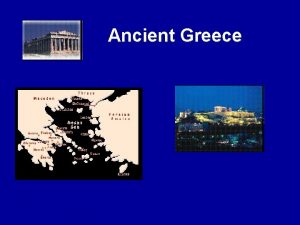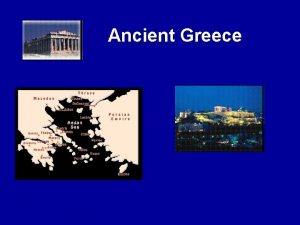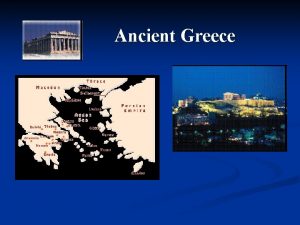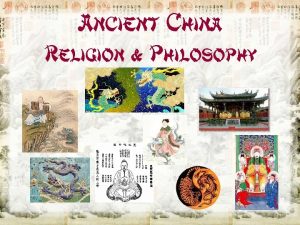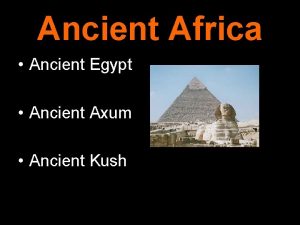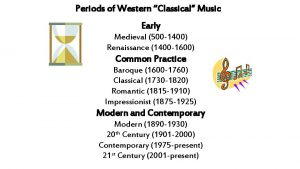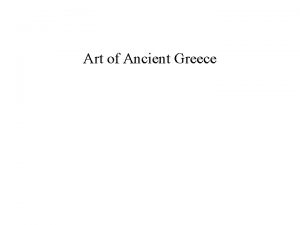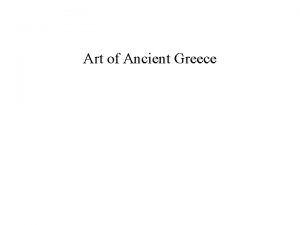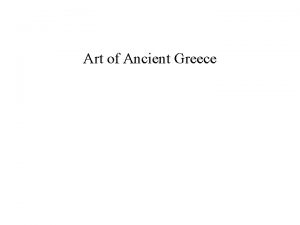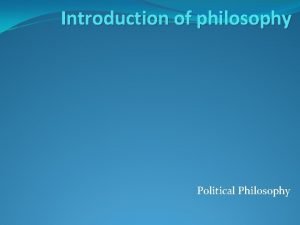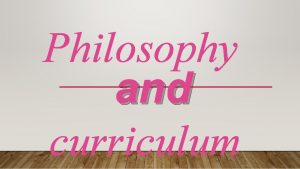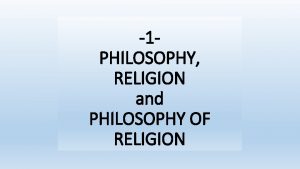Major Periods of Western Philosophy 1 Ancient 500






















- Slides: 22

Major Periods of Western Philosophy 1. Ancient: 500 BCE – 500 CE (Greece and Rome). Socrates, Plato, Aristotle, Epicurus 2. Medieval/Renaissance: 500 CE – 1600 CE (Judaism, Christianity, Islam). Augustine, Aquinas 3. Modern: 1600 CE – 1800 CE. Descartes, Hume, Locke, Spinoza, Leibniz, Berkeley, Kant

Rene Descartes Father of Modern Philosophy b. March 31 1596 in La Haye France wrote Meditations in 1641 d. February 11 1650

Background Galileo and the Copernican system The Protestant Reformation

Epistemology How do I know anything? What does it mean to know something?

The Skeptics Knowledge = A belief that cannot be doubted at all Knowledge is Impossible. We can only have beliefs

Hyperbolic Doubt


Am I really dreaming?

The Evil Genius

The Brain in a Vat


The Ego-Centric Predicament/ Problem of the External world How can I know if the world outside of my mind really exists? All I ever can know is what my mind perceives, not what really exists

The Truth I cannot Doubt Cogito; ergo sum I think; therefore I am

But What is this “I” who thinks?

I am a Thinking Thing!

Descartes way to the external world 1. I find a bunch of thoughts in my mind 2. Among those thoughts I find the idea of “God. ” 3. God = df. ‘a supremely perfect being’; i. e, a being that is all-knowing, allpowerful, & perfectly good. 4. I could not have come up with this idea of God on my own. Why? Because I am far too imperfect to originate the idea of a perfect being. 5. In fact, nothing in my experience is great enough to create in me the understanding of a supremely perfect being. 6. So, the only explanation for my having such a idea in my head is there is an actually existing perfect being that gave me the idea of itself. So, God exists 7. God, by definition, is perfect; including perfectly good 8. A perfectly good being would not deceive people 9. In other words, if I have an extremely strong inclination to believer certain things, then God would be deceiving me in letting continue to believe them, if they were not true. 10. I have an extremely strong inclination to believe that other people exist, bodies exist outside my head, etc. 11. Reminder: God is not a deceiver 12. So these things outside my head must exist.

Primary and Secondary Qualities Primary Qualities Secondary Qualities 1. Clear and Distinct 1. Not clear and distinct 2. Discovered through reason 2. Encountered through our senses 3. Mathematical qualities: Size, shape, figure, number, weight 3. Color and other subjective qualities

Theories of Perception Idealism – Physical objects are not real. Only minds and their ideas exist Direct Realism – The World is exactly as it appears to our senses Indirect Realism – Our primary experience is of ideas in our minds. These ideas are representations of objects in the world

Where do we get our knowledge? Empiricism Rationalism All knowledge comes from the senses Science is the best kind of knowledge we can have knowledge comes from self-evident truths grasped by the mind alone Logic and math are the best kind of knowledge we can have

Immanuel Kant 1724 -1804 Rationalism is wrong, because you cannot think unless you have sense experiences But equally Empiricism is wrong because you cannot have valid sense experience unless you first have concepts by which you can interpret your sense experience

Kant’s Core Concepts Ket Terms – Set 1) Analytic and Synthetic. Set 2) A Priori and A Posteriori Analytic concepts = True by definitions of the terms. “All Bachelors are unmarried men. ” Synthetic concepts = not true by definition; rather, they had information to our concept. For example, “Baboons can dance. ” A Priori truths = true prior to experience A Posteriori truths = true based on experience

Kant’s Synthetic A Priori Space & Time – Not an object of experience. Rather, it’s a “precondition of experience. ” We MUST think this way! So it makes no sense to consider whethere is some “reality in itself” that is different.
 Western music periods
Western music periods Progressivism in education
Progressivism in education 3500 / 500
3500 / 500 Lepenski vir
Lepenski vir Ancient art 30 000 b.c.–a.d. 400
Ancient art 30 000 b.c.–a.d. 400 Ancient india vs ancient china
Ancient india vs ancient china Ancient and modern communication
Ancient and modern communication What were the major achievements of ancient greece
What were the major achievements of ancient greece Uil literary criticism study guide
Uil literary criticism study guide Moseley periodic law
Moseley periodic law Gnc fertility blend male
Gnc fertility blend male Place value periods
Place value periods How do dogs reproduce
How do dogs reproduce Apush period 4 jeopardy
Apush period 4 jeopardy The georgian period 1910-1936
The georgian period 1910-1936 Target pay periods
Target pay periods 17 bible time periods
17 bible time periods Groups and periods
Groups and periods 6-2 pay periods and hourly rates
6-2 pay periods and hourly rates 6-2 pay periods and hourly rates
6-2 pay periods and hourly rates What is mechanical age
What is mechanical age Stages of infection
Stages of infection Groups and periods
Groups and periods







